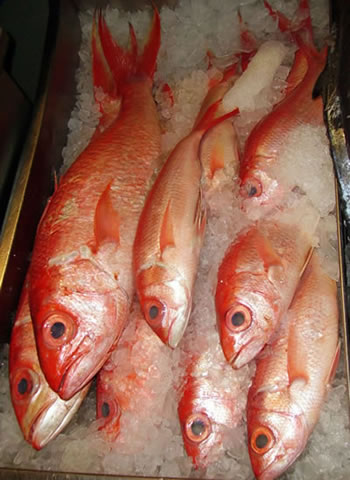And then I was face to face with a red snapper.

I don't often spend time near the seafood counter at the grocery store, nor do I actively seek out fishmongers on a regular basis. But I can recognize a red snapper, and I was mildly perturbed to see one on display at Wild Edibles Fish Market. I decided to leave one of my Seafood Watch seafood guides with whoever was on duty and send an email to the company when I got home.
Then I looked closer. There was a sign near the snapper with a bright red fish symbol and a description of why red snapper is not a recommended seafood choice. I surveyed the rest of the catch of the day; every fish was marked with a sign, and a not insignificant number carried the red "Avoid" tag. A sign hanging over the counter informed me that Wild Edibles was working with the Blue Ocean Institute to help people decide which seafood to buy.
They even had wallet-sized seafood guides available at the counter.
I was horrified. They were actually selling the fish that their own signs declared threatened or endangered. I asked the woman working the counter, "How can you sell this when you know that it's endangered?" Her response: "Well, we want the customers to decide. If they tell us to stop selling it, we'll stop selling it."
Let's tell them.
Tell them that they ought to know better. Tell them that they do know better. Let them know you don't want to see fish on the menu that, by any account, would be better described as "Endangered Species" than "Catch of the Day". And while you're at it, tell your local fish seller too. Go to your grocery store and see if they're selling red snapper, orange roughy, Chilean seabass, or any other endangered fish. Give them a seafood guide, or two, or ten.
While you're at it, you might want to let the Blue Ocean Institute know what you think of their endorsement, as well. Shame on them for lending their name to an irresponsible fish merchant.



1 comment:
This is an unfortunate side-effect of the popularization of being "earth-friendly" marketing - greenwashing. They look socially responsible, and in fact the store does have the potential ad opportunity to educate the fish-eating public about good seafood choices. However the fact that they continue to sell endangered and other red-labeled species shows they are far from really constructively changing how they do business.
Post a Comment